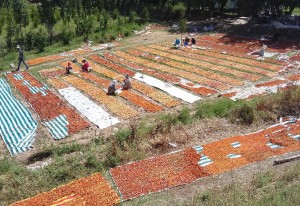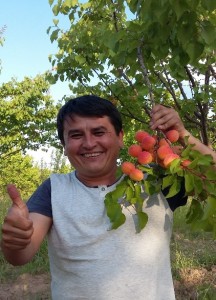Working to save apricots in Tajikistan
By Umeda Nabieva, ISD Consulting, Tajikistan
This post is part of the ADM Institute’s #PreventPHL blog campaign, following up on the First International Congress on Postharvest Loss Prevention. To read more posts in the series, click here.
My parents told me during my childhood that I should not waste food. If we throw away any food, it is regarded as a sin in my culture. I believe that it applies to any other country too. But one can ask where are food losses happening in the food supply chain in Tajikistan? Which food product has more losses and why is it happening? Aiming to answer to these questions within framework of the UNFAO project “SAVE FOOD”, I conducted an assessment of food losses and waste in Tajikistan.
Among selected agricultural products (wheat, potato, onion, apricot and milk) the study revealed that in Tajikistan food loss occurs at the beginning of food supply chains: agriculture production, postharvest handling and storage, and distribution stages. It is found that among selected agricultural products, apricot has highest losses in agriculture production, postharvest handling and storage and distribution stages.
Tajikistan has good apricot export potential. According to ITC, in 2014, total export value of dried fruits including dried apricot was USD $30,721. No doubt that preventing of postharvest losses can be beneficial to dehkan farms and households. There are many varieties of apricots in Tajikistan and all of them are generally harvested using the traditional method where the limbs are shaken with a stick, by hand or by shoving. The apricot fruits then fall directly onto the ground or are caught on a catching surface; the fruits are finally collected by hand and put into cases. It results in high levels fruit damage and losses nearly around 20-35%. Apricot has a very short period of maturity stage available for harvesting. Labor is in short supply during this period leading to overripe fruits and increased losses, therefore mechanical harvesting of apricot is necessary and very important for Tajikistan. Also bad weather conditions (wind, rain, hail) may cause losses during the agriculture production stage resulting in ripened apricots fall to ground and being damaged.

Drying apricot at the field, Isfara, Soghd Oblast, Tajikistan / Khairullo Rizoev “Golden fruits” LLC
Due to lack of adequate storage facilities, fresh apricot is sold in domestic markets or dried. Usually, the apricot is dried on cellophane or on the ground and farmers use traditional sulfur smoking methods to preserve the fruit (right). These practices lead to dramatic postharvest losses and a severe decrease in the quality of the fruit due to exposure to weather and overheating. Depending on the type of apricot there are natural losses in drying process which varies from 10 to 70% of the original fresh weight of the apricot.
During the assessment, it is found that level of post harvesting losses depends on state-of-the-art technology, management, qualification and capacity of farmers, and resources available to the farmers, therefore the extent of PHL differs depending whether the specific product is produced and
marketed by small producers and retailers, or by large producers applying modern technologies, production and retail practices.
Some recommendations to prevent PHL of apricot in entire food supply chain are:
- Capacity building and training of farmers on new technology for harvesting of apricots;
- Introduction of hygienic and safe apricot drying method; Implementation of Global GAP, HACCP and QMS;
- Improvement of packaging, introduction of new innovative packaging and storage technology;
- Access to effective disinfectant for apricot tree; integrates state approach against insects, pests and diseases;
- Need to developone ortwo industrialvarietiesof apricots and saplings;
- Stimulate implementation of drip irrigation in the gardens;
- Organize winter irrigation; Supply of year around electricity;
- Conduct more researches, assessments, monitoring programmes, and sharing of practices for prevention of PHL.
If you know any other effective methods of prevention of PHL in apricot, please let me know so that we can SAVE APRICOT in Tajikistan. The full report can be accessed here.
The blog entries in this #PreventPHL series are by students and members of our PHL Prevention community of practice. The opinions expressed are those of the individual authors and do not necessarily reflect the position of the ADM Institute. In addition, none of the statements should be considered an endorsement of any person, product, or technique by the ADM Institute.




Add Comment